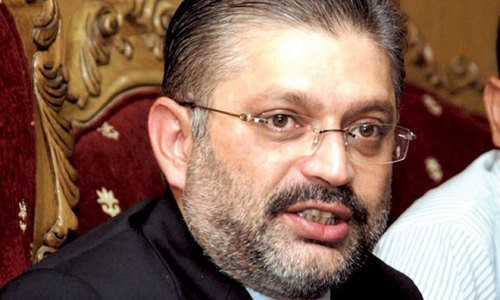ISLAMABAD: A doctor working at the Central Jail, Lahore, on Tuesday told the Islamabad High Court (IHC) that former prime minister Nawaz Sharif is a chronic patient and is suffering from various ailments.
In response to a question put by a division bench of the IHC comprising Justice Aamer Farooq and Justice Mohsin Akhtar Kayani about the health of Mr Sharif, Medical Officer Dr Shakeel Irfan said the former prime minister “is basically sick and taking medicines since 2001”.
When the bench asked him whether Mr Sharif had been admitted to hospital, the doctor said: “At present, he is in jail.”
The court was hearing a petition seeking suspension of the seven-year jail term handed down to the former premier by an accountability court in the Al-Azizia reference.
Additional Prosecutor General of the National Accountability Bureau (NAB) Jahanzeb Bharwana criticised Mr Sharif over his decision of refusing to avail medical treatment in hospital and insisting on staying instead in the Central Jail, Lahore.
Defence counsel claims that former premier’s life will come under threat if he is not released from prison
Mr Sharif’s counsel Khawaja Haris replied that the prosecution was not giving the true picture of the episode.
Last week the former prime minister decided to go to the prison from the Services Hospital, Lahore, when a medical board recommended that he be admitted to a cardiac department. However, the hospital lacks this facility.
On Feb 7, Mr Sharif’s daughter Maryam Nawaz criticised what she called “non-serious attitude of the authorities” and pointed out that four successive medical boards had been formed to assess her father’s health.
She said that her father was “not a gypsy. He insisted on going back to the jail because he could not tolerate any more humiliation”.
Earlier, the court took up an application filed by Mr Sharif’s counsel seeking withdrawal of an identical petition for suspension of the sentence on legal grounds.
Mr Bharwana and NAB’s special prosecutor Sardar Muzaffar Abbasi argued that when the petition was filed Mr Sharif was facing cardiac issues as he was a chronic heart patient.
They said the apex court had set certain guidelines for suspension of sentence and grant of bail in the Avenfield properties reference and Talat Ishaq case.
Mr Haris then read out the relevant portion of the judgement and pointed out that a larger bench of the Supreme Court had declared that bail could be granted in exceptional circumstances or hardship cases.
The defence counsel argued that former premier’s life would come under threat if he was not released from prison because he was a chronic heart patient.
The petition seeking Mr Sharif’s release on medical grounds said the ex-premier felt pain in both his arms and numbness in his toes. The matter was brought to the notice of the jail superintendent, who referred the case to the Punjab Institute of Cardiology (PIC), Lahore, and the Allama Iqbal Medical College (AIMC)/Jinnah Hospital, Lahore.
It added that a special medical board was separately constituted to assess the petitioner’s health. Although the medical examination of the petitioner was conducted by each of the special medical boards and a preliminary report, in the case of PIC, and a final report, in the case of AIMC, was prepared on Jan 16 and Jan 17, respectively, these reports, or the results of lab tests on which they were based, were not shared with the petitioner nor his personal physician until Jan 22. (The final report of PIC was made available on Jan 24).
The petition said: “The past medical history of the petitioner [showed] that the petitioner has been suffering from ischemic heart disease & coronary artery bypass grafting (CABG), hypertension (HTN), T2 diabetes mellitus, and chronic kidney disease (CKD).”
“On the basis of the abnormalities exhibited by the lab data as noted above, the special board constituted by the Allama Iqbal Medical College, Lahore, has made an assessment to the effect that the petitioner has Stage 3 CKD problem secondary to Diabetic Nephropathy and HTN; Uncontrolled HTN; Mild Proteinuria; Suboptimal T2 Diabetes Control; Metabolic Acidosis Nephrolithiasis (i.e. kidney stones) and benign renal cysts,” said the petition.
It added: “In the light of the findings given and recommendations made by the two special medical boards in their respective reports as reproduced in the foregoing paragraphs, the petitioner prays for the suspension of his sentence and release on bail pending final decision of his appeal on purely medical grounds as a case of extreme hardship.”
The hearing in the case has been adjourned till February 18.
Published in Dawn, February 13th, 2019















































